 Petzlover
Petzlover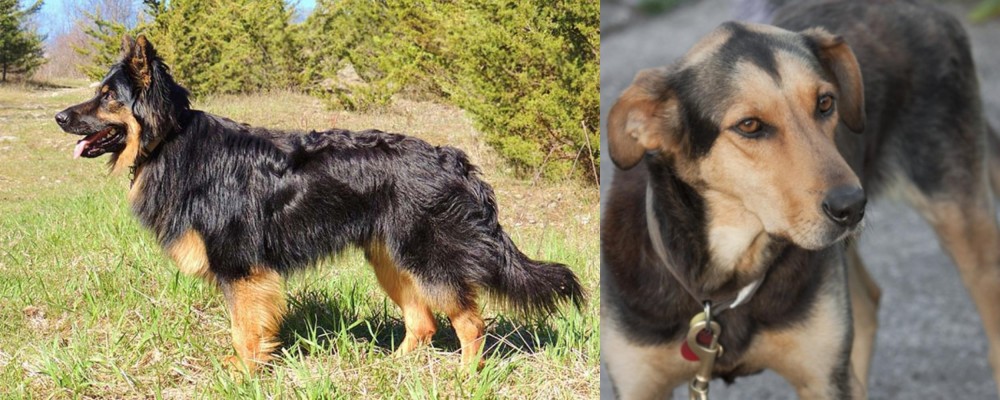 Bohemian Shepherd is originated from Czech Republic but Huntaway is originated from New Zealand. Bohemian Shepherd may grow 10 cm / 3 inches shorter than Huntaway. Bohemian Shepherd may weigh 21 kg / 46 pounds lesser than Huntaway. Both Bohemian Shepherd and Huntaway has almost same life span. Both Bohemian Shepherd and Huntaway has almost same litter size. Bohemian Shepherd requires Moderate Maintenance. But Huntaway requires Low Maintenance
Bohemian Shepherd is originated from Czech Republic but Huntaway is originated from New Zealand. Bohemian Shepherd may grow 10 cm / 3 inches shorter than Huntaway. Bohemian Shepherd may weigh 21 kg / 46 pounds lesser than Huntaway. Both Bohemian Shepherd and Huntaway has almost same life span. Both Bohemian Shepherd and Huntaway has almost same litter size. Bohemian Shepherd requires Moderate Maintenance. But Huntaway requires Low Maintenance
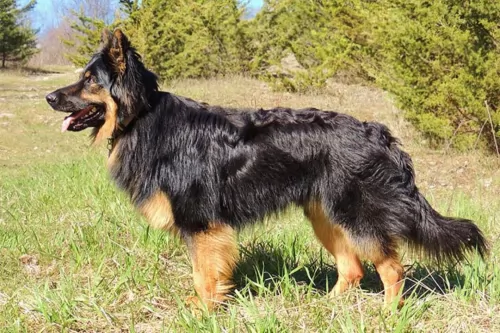 Known as the Chodský pes or the Chodenhund, the Bohemian Shepherd is native to the Czech Republic and is a herding breed. Like many other old dog breeds, nothing is 100% certain about is history. This is thought to be because the breed was developed centuries before the keeping of records. It is certain however, that the breed developed in the south-western portion of the Kingdom of Bohemia, which is now part of the Czech Republic.
Known as the Chodský pes or the Chodenhund, the Bohemian Shepherd is native to the Czech Republic and is a herding breed. Like many other old dog breeds, nothing is 100% certain about is history. This is thought to be because the breed was developed centuries before the keeping of records. It is certain however, that the breed developed in the south-western portion of the Kingdom of Bohemia, which is now part of the Czech Republic.
It is believed the Bohemian Shepherd came from herding dogs such as the Pinscher/Schnauzer, Spitzen or even a dog/wolf hybrid. It was in November 1991, that the Bohemian Shepherd Lover’s Club was founded. Many Bohemian Shepherd breeders have been registered and today the breed has earned the reputation for being a superb family dog. The dog has also been granted recognition with the Czech National Kennel Club.
 The Huntaway or New Zealand Huntaway is a herding dog that originated in the New Zealand sheep country. Their main purpose is to drive sheep and they are not an old breed. They were developed late in the 19th century for their working skills. The only real criteria was that they were black and tan. A dog must win a trial in order to be placed in the New Zealand Sheep Dog Trial Association studbook. They drive sheep mainly through their deep, loud voice.
The Huntaway or New Zealand Huntaway is a herding dog that originated in the New Zealand sheep country. Their main purpose is to drive sheep and they are not an old breed. They were developed late in the 19th century for their working skills. The only real criteria was that they were black and tan. A dog must win a trial in order to be placed in the New Zealand Sheep Dog Trial Association studbook. They drive sheep mainly through their deep, loud voice.
In the New Zealand high country there was a need for a working dog with stamina, agility and intelligence to work the sheep as a drover (herder). The dog had to be able to handle rough, steep land and work with very large groups of sheep. The sheer area of land that the sheep graze and the dog would have to cover, demanded that this dog have stamina and strength to cover large pasture land and work for days if necessary. Before this the shepherds had used British sheepdogs but they preferred dogs that barked while working. So they bred the British Sheepdogs with Collies, Border Collies, Labrador, Rottweiler, Doberman and other barking sheepdogs to create the Huntaway. In addition to the bark, they bred for stamina and size.
They were participating in field trails in 1870 and ads for them were seen in newspapers by 1884. They became a separate breed in the 20th century. Today they are spreading around the world and are becoming very popular. It is not recommended that they be kept as pets however, since they are true working dogs.
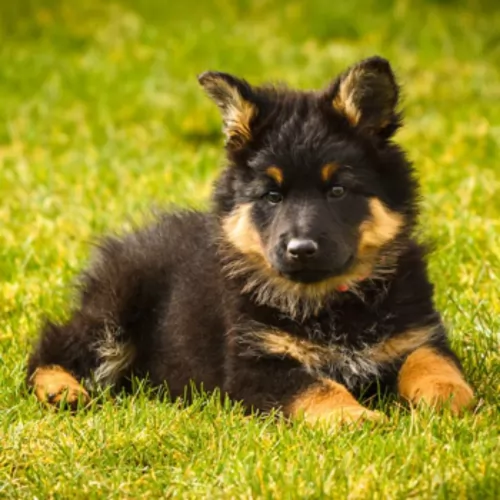 The medium sized Bohemian Shepherd looks much like a combination between the Collie and German Shepherd. He is 48-55 cm in height and weighs about 15-25 kg. The Bohemian Shepherd has a thick, long coat which is black and tan in color and with an undercoat, allowing him to cope in icy weather conditions. His well proportioned body is muscular and compact with a long bushy tail and erect ears.
The medium sized Bohemian Shepherd looks much like a combination between the Collie and German Shepherd. He is 48-55 cm in height and weighs about 15-25 kg. The Bohemian Shepherd has a thick, long coat which is black and tan in color and with an undercoat, allowing him to cope in icy weather conditions. His well proportioned body is muscular and compact with a long bushy tail and erect ears.
The Bohemian Shepherd makes a wonderful family pet, becoming very attached to his human family. He has a good reputation with children too and will get on well with other pets in the home. He is so amicable that he makes a good pet choice for those looking to own a dog for the first time.
He is intelligent and alert and also protective of his family, making him an excellent guard dog. He is easily trainable, and just like with any other dogs, will require training and socialization.
 The Huntaway is a large dog with a deep chest and a black and tan coat. They are strong, big and muscular with voices to match. They herd, head, work the sheep in pastures and force them into pens. They are bred to have that big authoritative, deep bark. They do not yap. Their bodies are well proportioned but longer than high. They have well - padded feet and a deep chest for stamina, along with strong legs and body that allows them to run fast and change directions at will.
The Huntaway is a large dog with a deep chest and a black and tan coat. They are strong, big and muscular with voices to match. They herd, head, work the sheep in pastures and force them into pens. They are bred to have that big authoritative, deep bark. They do not yap. Their bodies are well proportioned but longer than high. They have well - padded feet and a deep chest for stamina, along with strong legs and body that allows them to run fast and change directions at will.
The tail of a Huntaway if long, while their heads are shaped like blocks while the muzzle is long and the nose is black. They have dark, round eyes and long ears. An unusually attractive dog, they have dense fur with fringe on the tail and chest. There is characteristics a very large variety in the in the way the breed looks from one dog to the next. Thus they do not participate in confirmation events, as the standard is based on working characteristics rather than appearance guidelines. They are more a “class” than a “breed”.
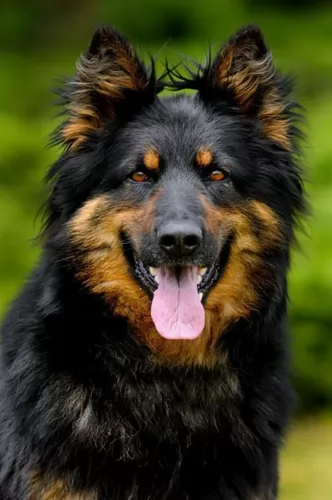 Playful by nature, friendly, gentle and co-operative, your Bohemian Shepherd will make a wonderful pet and he is a real social character, loving to spend lots of time with his human family. With minimal health conditions and without requiring much maintenance, he is an adaptable dog and will easily settle into city- or country living, so long as he is given regular exercise and attention.
Playful by nature, friendly, gentle and co-operative, your Bohemian Shepherd will make a wonderful pet and he is a real social character, loving to spend lots of time with his human family. With minimal health conditions and without requiring much maintenance, he is an adaptable dog and will easily settle into city- or country living, so long as he is given regular exercise and attention.
He is courageous and intelligent and also makes an excellent guard-dog. With so much going for this beautiful dog, he simply makes a loyal, loving and devoted family pet.
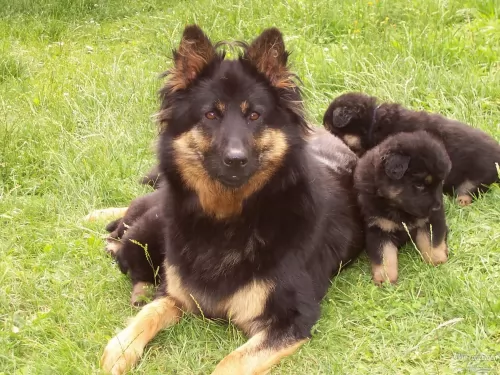 Breeding organizations are continually trying to minimize the diseases within limited-gene-pool dog breeds. While the Bohemian Shepherd is a generally health breed, there are diseases that are more common with the Bohemian Shepherd and which you need to be aware of -
Breeding organizations are continually trying to minimize the diseases within limited-gene-pool dog breeds. While the Bohemian Shepherd is a generally health breed, there are diseases that are more common with the Bohemian Shepherd and which you need to be aware of -
This is a painful disease – a problem with the formation of the hips – where the dog can develop arthritis and even become lame.
This is a condition where gas gets trapped in the stomach of your pet, so that he swells up, sometimes causing the stomach to twist. This is an emergency for your pet and it is extremely painful. Nobody really knows the cause, but when the gas is trapped inside the stomach, the bloated stomach of your pet requires you getting to the vet as quickly as you can.
Look out for Progressive Retinal Atrophy known as PRA . This is a group of degenerative diseases that affect the photoreceptor cells where the cells deteriorate and can result in blindness with your pet. Fortunately it isn’t a painful condition.
 The Huntaway is a pretty healthy breed, developed as it was from the sheepdogs and collies. They still face some inherited issues such as:
The Huntaway is a pretty healthy breed, developed as it was from the sheepdogs and collies. They still face some inherited issues such as:
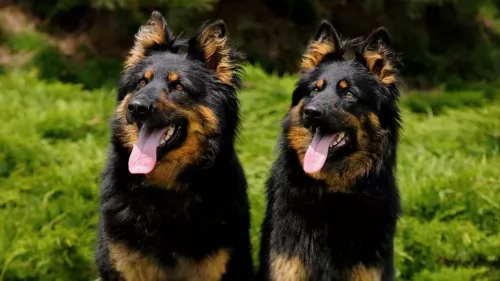 The Bohemian Shepherd is an energetic breed and will need to be exercised regularly. He’ll love to run alongside your bike on your cycling trips or you can take him on a long walk. Having said that, he is an easy going dog and can adapt to city- and country life, but if it’s city life, you can’t leave him cooped up in a small yard and think that will suffice. He has a personality that longs to be part of the family.
The Bohemian Shepherd is an energetic breed and will need to be exercised regularly. He’ll love to run alongside your bike on your cycling trips or you can take him on a long walk. Having said that, he is an easy going dog and can adapt to city- and country life, but if it’s city life, you can’t leave him cooped up in a small yard and think that will suffice. He has a personality that longs to be part of the family.
Your Bohemian Shepherd is a moderate shedder in spite of his thick beautiful coat. The coat will certainly need a good brushing at least twice a week to get rid of that loose hair. Not only that, your social Bohemian Shepherd will love the closeness to you that the brushing brings.
Keep his nails short and his teeth brushed at least 2 or 3 times a week to ensure there is no plaque build up. There are special toothbrushes and toothpastes made for dogs. Don’t use human toothpaste as the ingredients will be harmful to your pet.
Your Bohemian Shepherd, after one year of age, will eat one or two bowls of food a day. You’ll be able to tell what suits your dog, because the amount will eat about 2 to 4 cups of a good quality dry dog food a day, split into at least two meals. The amount can vary depending on its health, build, age, activity level and metabolism. Make sure it has access to water at all times and that it is changed as often as possible.
 If you are not using your Huntaway to herd, then feed a medium formula not a high protein, high calorie formula. Feed 3-4 times a day and 1-2 cups.
If you are not using your Huntaway to herd, then feed a medium formula not a high protein, high calorie formula. Feed 3-4 times a day and 1-2 cups.
3 cups per day feeding twice a day high quality medium calorie food.
Exceptional stamina
This herding breed has a great need of mental and physical stimulation. They were born to herd and to do so over vast tracts of land in challenging conditions. They need to be challenged. They need daily exercise at a very high level. A Run them every day or take them on a couple of long walks. They will excel in field trials, Barnhunt, agility and rescue. They love to learn.